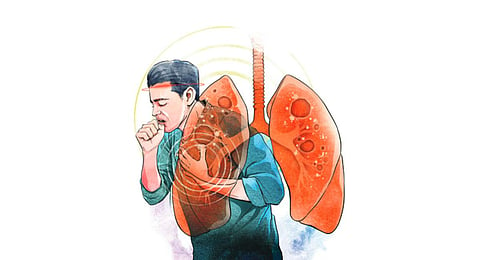

NEW DELHI: To eliminate tuberculosis in India, which tops the list of 30 countries with high-burden TB cases, the centre announced that a 100-day intensified campaign will be launched across 347 high-priority districts in 33 states and union territories.
The campaign is aimed to enhance TB case detection, reduce diagnostic delays, and improve treatment outcomes, particularly in high-risk groups will be launched by Union Health Minister JP Nadda in the presence of state Chief Minister Nayab Singh Saini and State Health Minister Arti Singh Rao on Saturday from Panchkula, Haryana.
The Union Health Ministry on Friday also denied a shortage of anti-TB drugs in the country. Noting that media reports claiming scarcity of the drugs are ‘incorrect and misleading,” the ministry said that during the 100-day campaign, the programme targets high-focus districts for intensified interventions.
“These include enhanced case detection through community awareness campaigns, comprehensive screenings, and the provision of diagnostic tools for timely detection,” a statement issued by the ministry said.
“Significant efforts are being made to ensure the availability of all commodities, including the anti-TB drugs, across all levels, including 347 districts. Regular assessments are being conducted to evaluate the stock positions at various levels, from central warehouses to peripheral health institutes,” it added.
It also said that till December 6, more than two months' stock of all essential anti-TB drugs is available under NTEP.
“Adequate measures have been taken for timely procurement and supply of anti-TB drugs, and orders have been placed. The suppliers have already started to ensure sufficient stocks are available to meet increased requirements during the campaign. The ministry has also taken adequate steps to enhance the buffer stock of drugs to more than 6 months at each level.”
Before the campaign's launch, the Union Health Secretary Punya Salila Srivastava wrote to various ministries and departments “for active participation and timely support in the upcoming nationwide initiative crucial to improve public health across the nation through a significant reduction in the incidence and mortality rates of tuberculosis.”
During the 100-day campaign, these ministries were asked to engage with all organisations, display IEC materials in all offices, engage with urban local bodies and mobilize local resources and budget for TB awareness; awareness generation among staff; taking Ni-kshay Shapath (pledge from January 27 to February 2 in all offices), dissemination of awareness messages on social media of the ministry, and registration of Ni-kshay Mitra in all offices.
India has set 2025 as its target year for TB elimination, five years ahead of the target set by SDG.
According to the latest WHO’s Global Tuberculosis Report 2023, India tops the list of 30 countries with high-burden tuberculosis cases. It said the disease disproportionately affects people in 30 high-burden countries, with India (26%), Indonesia (10%), China (6.8%), the Philippines (6.8%) and Pakistan (6.3%) together accounting for 56% of the global TB burden.
According to the report, the total TB incidence in India in 2023 was 2,800,000, while the rate per 1,00,000 population is 195. The TB incidence in people living with HIV was estimated to be 42,000.
According to a written reply in the Rajya Sabha, Minister of State of Health and Family Welfare Anupriya Patel said 21.69 lakh tuberculosis cases have been notified between January and October 2024. “The notified TB cases increased from 18.05 lakh in 2020 to 25.52 lakh in 2023,” she said.
The ministry said that the 100-day campaign underscores the government of India’s commitment to achieving the goal of end-TB by addressing the challenges of tuberculosis (TB) notification and mortality in India under the National TB Elimination Programme (NTEP) of the Ministry of Health and Family Welfare.
“It represents yet another significant strategic effort by the country in its bid to strengthen programmatic activities and reduce disparities in TB outcomes across diverse regions of the country to achieve the aim of TB elimination,” the statement said, adding that the initiative is in line with the vision of a TB-Mukt Bharat that was laid out by the Prime Minister Narendra Modi, at the 2018 Delhi End TB Summit.
The 100-day campaign envisages improving programme performance on key output indicators, viz. TB incidence rates, diagnostic coverage, and mortality rates. It also aligns with recent policy enhancements by the Ministry, including increased financial aid for TB patients under the Ni-kshay Poshan Yojana and inclusion of household contacts under the social support initiative, Pradhan Mantri TB Mukt Bharat Abhiyaan.
Some of the key focus areas of the campaign are increasing access to advanced diagnostics, targeted screening among vulnerable groups, specialised care for high-risk individuals, and provision of expanded nutritional support. The initiative will leverage the vast network of Ayushman Aarogya Mandirs nationwide that have taken TB services to the last mile.